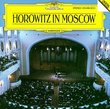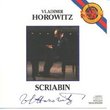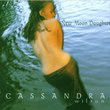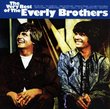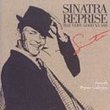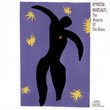| All Artists: Johann Sebastian Bach, Domenico Scarlatti, Frederic Chopin, Claude Debussy, Franz [Vienna] Schubert, Leon Fleisher Title: Leon Fleisher: Two Hands Members Wishing: 1 Total Copies: 0 Label: Artemis Classics Release Date: 8/24/2004 Genre: Classical Styles: Opera & Classical Vocal, Chamber Music, Forms & Genres, Short Forms, Sonatas, Historical Periods, Baroque (c.1600-1750), Classical (c.1770-1830), Romantic (c.1820-1910), Instruments, Keyboard Number of Discs: 1 SwapaCD Credits: 1 UPC: 699675155124 |
Search - Johann Sebastian Bach, Domenico Scarlatti, Frederic Chopin :: Leon Fleisher: Two Hands
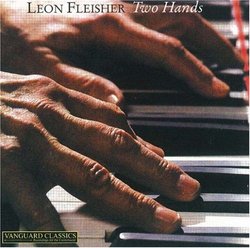 | Johann Sebastian Bach, Domenico Scarlatti, Frederic Chopin Leon Fleisher: Two Hands Genre: Classical
In pianist Leon Fleisher's return to playing with both hands, an indomitable spirit has triumphed over physical adversity. Not that he has been absent from music since losing the use of his right hand to focal dystonia in ... more » |
Larger Image |
CD DetailsSynopsis
Amazon.com In pianist Leon Fleisher's return to playing with both hands, an indomitable spirit has triumphed over physical adversity. Not that he has been absent from music since losing the use of his right hand to focal dystonia in 1965: in addition to forging a successful career as teacher and conductor, he performed the left-hand literature with peerless mastery, enlarging it with new commissions. However, he persisted in searching for a cure, and his determination has now borne fruit: this is his first record of the two-hand repertoire in 40 years. It is altogether extraordinary. Always a great pianist and musician, Fleisher has lost none of his powerful, consummate technique (not surprisingly, his left hand is enormously strong), his rhythmic and tonal control, his expressive projection. His sound is ravishingly beautiful, rich, full, singing, delicate, capable of infinite variations of dynamics, color and nuance; his intellectual and emotional concentration are riveting. The program features familiar short pieces and Schubert's great last sonata. Two Bach transcriptions, one by Myra Hess, one by Egon Petri, are overloaded and artificial, but played with reverential simplicity; a Scarlatti Sonata is scintillating without being fast; a Chopin Mazurka and Nocturne and Debussy's "Clair de lune" are frankly sentimental, very poetic, free, slow and dreamy. They invite the listener to focus on the playing rather than the music. The Schubert is monumental. Fleisher's vitality and exuberance belie his 75 years, though his impetuosity sometimes leads to jerkiness (in the Scherzo), and rushed tempi (in the Finale). His dynamics can be wayward, but the texture, even at its richest, is always crystal clear; every line stands out, indeed some seem newly discovered. There is plenty of time for reposeful rests, poised transitions, changes of harmony, color and mood; the sense of depth, breadth, coherence and continuity never falters. --Edith Eisler Similarly Requested CDs
|
CD ReviewsRelaxed assuredness Daniel Graser | Wappingers Falls, New York United States | 05/30/2005 (5 out of 5 stars) "Fleisher came to my school a few years ago playing his Carnegie Hall program which is mainly featured on this disc. A friend of mine I think put it best, "He didn't play the piano he worked with it. The fingers moved, the hammers hit the strings and a state of absolute ecstasy descended on the crowd who were absolutely spellbound for the entire recital." In the age of younger and younger "virtuosos" this is a welcome return to the art of serving the music, not vice versa. The Bach pieces act as a warm-up to the rest of the recital. The night pieces by Debussy and Chopin take us into a dark world of colors and beauty. The Schubert sonata finishes the recital with a monumental work played immaculately. The balance between the hands is perfect and the clarity of the notes is the best I have ever heard in a pianist since a brilliant young virtuoso recorded the Brahms concertos with George Szell fifty years ago. Also pick up his left hand recitals as they are just as dazzling. This is easily the best solo piano release of the last half century. Wonderful!" A new lease on life for a great pianist. Miles D. Moore | Alexandria, VA USA | 01/16/2005 (5 out of 5 stars) "Before the release of Leon Fleisher's "Two Hands," I had thought that Botox was strictly a new craze for vain Hollywood actors and socialites with more money than sense. I never thought it would have such utility that it could bring Leon Fleisher back to the public as a two-handed pianist. But, according to the liner notes, Botox treatments have alleviated Fleisher's dystonia (a cruel muscle disease that prevented the full extension of the fingers of his right hand) to the point that he can make concert appearances and record again after nearly four decades. Fleisher may not be recording any Liszt any time soon ("Even with the Botox, there are things that I cannot do," he confesses), but the repertoire of beloved piano favorites on this album are well within his technical and interpretive grasp. Some reviewers on this site have compared Fleisher's "Jesu, Joy of Man's Desiring" unfavorably with Dinu Lipatti's recording; while Lipatti's version may well be the single greatest piano recording ever, I see absolutely nothing wrong with Fleisher's version. Similarly, I think his versions of "Clair de Lune" and the great Schubert D. 960 Sonata on this CD are as fine as any I've heard on disc. Both as a document of human courage and of exquisite pianism by a major artist, this CD is a must-have." "Nobody can be ever compared to this giant..." John Wilde | FRANCE | 02/20/2005 (5 out of 5 stars) "I was recently discussing the quality of this Fleisher's recording with my friend Leontsky, himself composer and pianist. We were both enthusiastic.I cannot resist reporting what Leontsky told me about that album : " The fact is nobody can be ever compared to this giant...He's the tenderness personified, the tenderness itself...whereas Gould, for example, is the Mind itself...Just listen to the Mazurka in C# minor or the Db major Nocturne played by Fleisher!...Fleisher hasn't two hands, he has one single Heart...Nobody can play like this without the intelligence of the Heart...I remember Busoni's old version of the famous Bach Choral...we are so far from Busoni...Fleisher is far beyond because he's understood what i've myself searched for years and years : how to sing through a piano...and, here, in this unbelievable recording, this piece of wood we call pianoforte suddenly becomes Fleisher's voice."
i told Leontsky that this recording was very successful now. He answered : "This is a proof that people always make the right choice...which will always be the choice of the Heart...and the largest audience is to be trust forever."" |

 Track Listings (10) - Disc #1
Track Listings (10) - Disc #1
